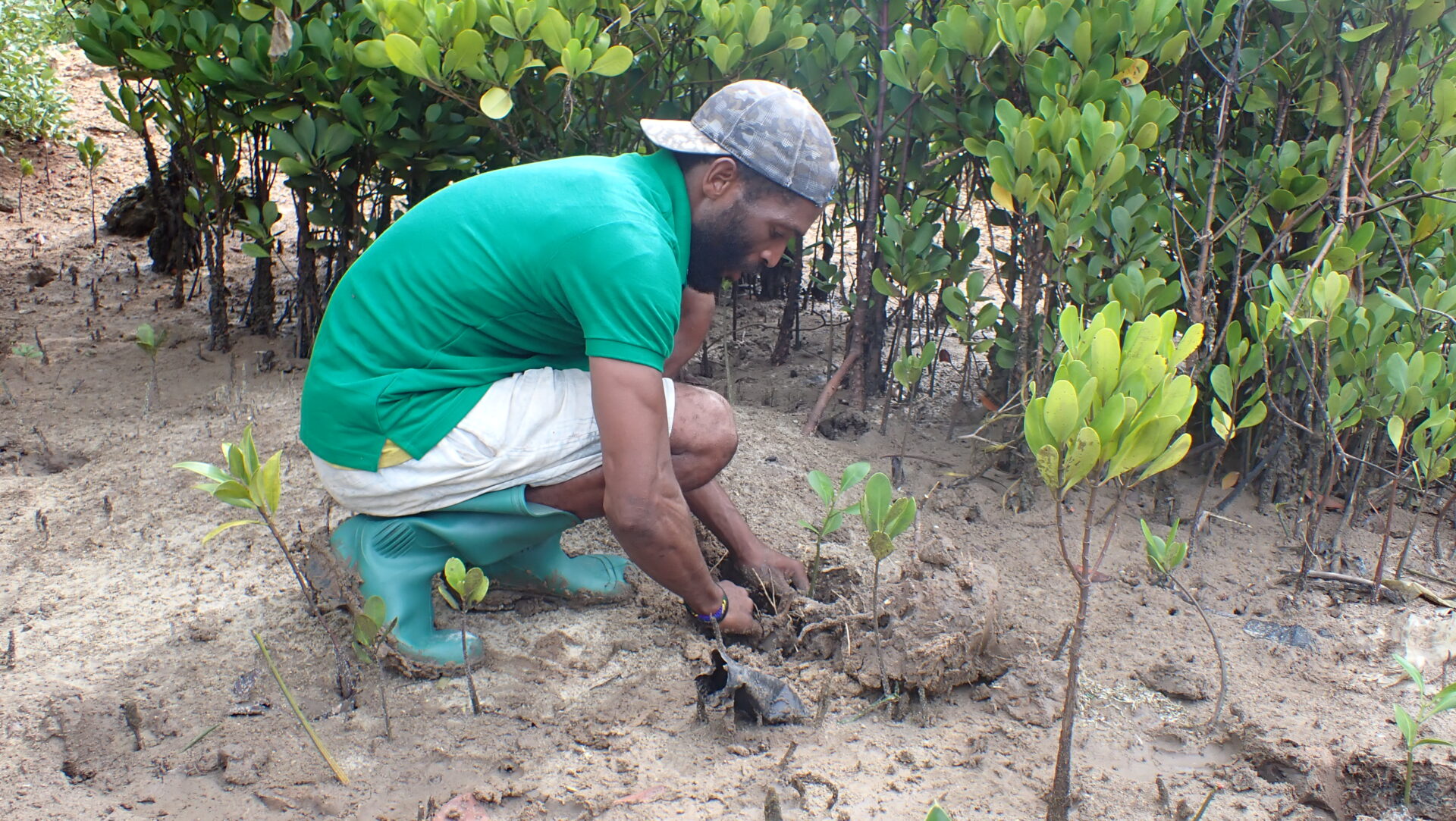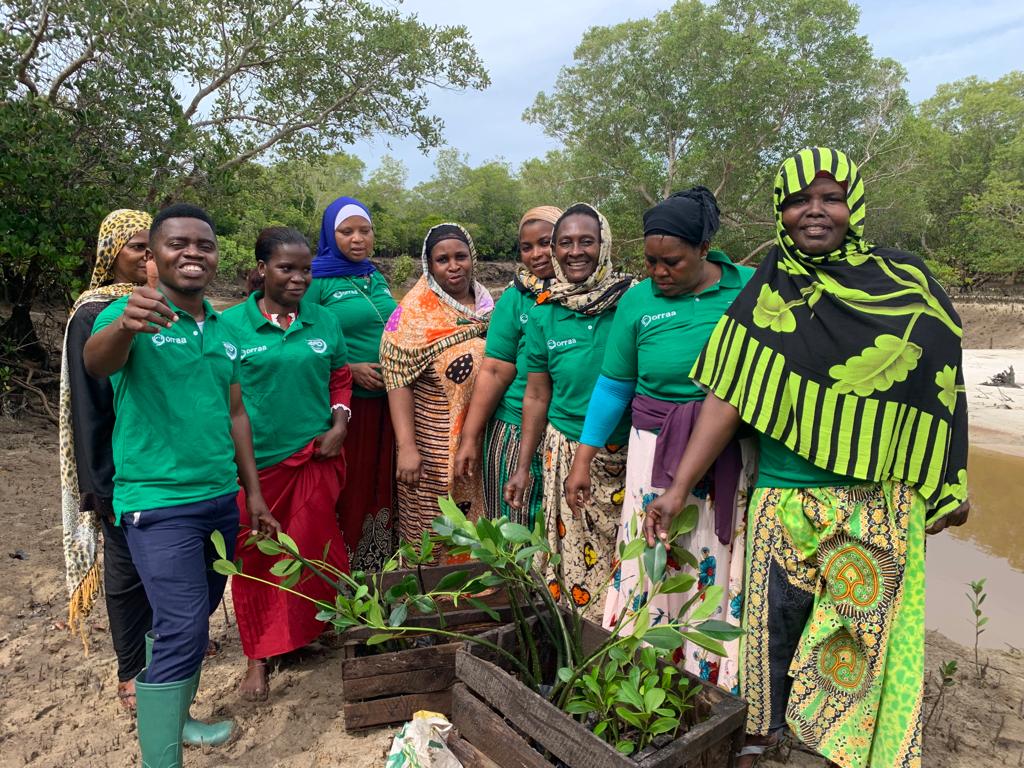ORRAA Action Report 2021
Read about the innovative projects undertaken by ORRAA, in conjunction with its members, in 2021, in our first Action Report.

Project Lead: AquaFarms Organization (AFO)
Financial Support: Received mentoring and capacity building support from ORRAA’s Ocean Resilience Innovation Challenge, which was financially supported by the Government of Canada. Direct financial support has been provided by the UK’s Blue Planet Fund and by the Government of Canada.
Location: Tanzania
ORRAA is working with Tanzanian NGO AquaFarms Organization (AFO) to enhance the resilience of coastal communities around Dar-es-Salaam, by establishing new sustainable sources of income from the rehabilitation of mangrove forests. The community-led solution is shifting behaviours from destruction to conservation, with a voluntary carbon market and beekeeping, which generates funds to be invested directly back into local facilities. ORRAA supports AFO as one of the winners of the first round of the Ocean Resilience Innovation Challenge (ORIC). Since then, AFO has received further funding from ORRAA through the UK’s Blue Planet Fund and the Government of Canada to scale its project.
Mangrove forests provide a host of ecosystem services and sequester five to 10 times more carbon than terrestrial forests. Yet, they are amongst the most threatened habitats on earth, with climate change and human activities driving their destruction. It is estimated that a fifth of mangrove forests were lost globally between 1980 and 2005. The loss of these forests can have devastating consequences for the communities who depend on them for their livelihoods and protection.
In Tanzania, mangroves are routinely cut down for firewood, medicinal purposes, and construction materials, or they are trampled to access floodplains used for fishing or to create rice fields. Despite government action and voluntary efforts by communities to stop these practices over the last three decades, mangroves continue to be destroyed or damaged to meet these short-term needs.
To reverse this trend and create ways for people to benefit from mangrove conservation rather than their degradation, Aqua-Farms Organization (AFO), an NGO dedicated to supporting a sustainable blue economy, is working with the Mbweni and Kunduchi communities on the outskirts of Dar-es-Salaam to create a Voluntary Community Mangrove Carbon Credit (VCMCC) market. The project’s goal is to improve the communities’ resilience by generating long-term revenue from their local forests.
Early in the project, AFO worked with local women’s groups to provide training in replanting mangroves. The team used available academic research on the hydrology and soil of the area, as well as lessons learnt from previous local replantation initiatives, to help local women select the best species and plant them using techniques based on traditional ecological knowledge.
Since 2018, over 13,000 mangrove seedlings have been successfully replanted across four hectares of mangroves both at Mbweni and Kunduchi sites. In parallel, AFO is providing beehives, tools, and training to over 40 women in Mbweni and Kunduchi, empowering them to earn an independent and sustainable alternative source of income through beekeeping and the sale of honey and derived products.
Through its first Ocean Resilience Innovation Challenge, ORRAA has supported AFO in refining its business model and in conducting research to quantify the amount of carbon sequestered by the restored forests. With direct financial support from the UK’s Blue Planet Fund, ORRAA has subsequently helped AFO to plant an additional 20,000 seedlings and provide several women’s groups with beehives. The support from ORRAA is also helping AFO establish a partnership with Plan Vivo to verify its estimates, provide certification to its carbon credits, and connect with potential voluntary market buyers.
The project requires a further investment of USD $600,000 and will generate an estimated USD$80,000 every year over 20 years in community revenue through the sale of carbon credits to voluntary buyers and through beekeeping. In its first 20 years, the project will enable the capture of 60,000 tons of CO2 emissions. Beyond incentivising the restoration of precious ecosystems, the project will directly benefit the community by ensuring the funds raised go to finance village facilities such as water wells and education equipment. AFO has also earmarked 15% of the project’s revenue to be used for the creation of a Mangrove Conservation Fund dedicated to scale the initiative and expand it to two more mangrove forests in North Tanzania by 2030.

“When we started replanting mangroves here in 2013, we were doing it just for the love of our environment, without knowing what mangroves would do for us. But now I see blue carbon is much more important than we thought for the health of our planet. We hope that the establishment of this project will create an ecosystem where communities live in harmony with nature.”
Bernard Kaitira, Community Representative at Kunduchi